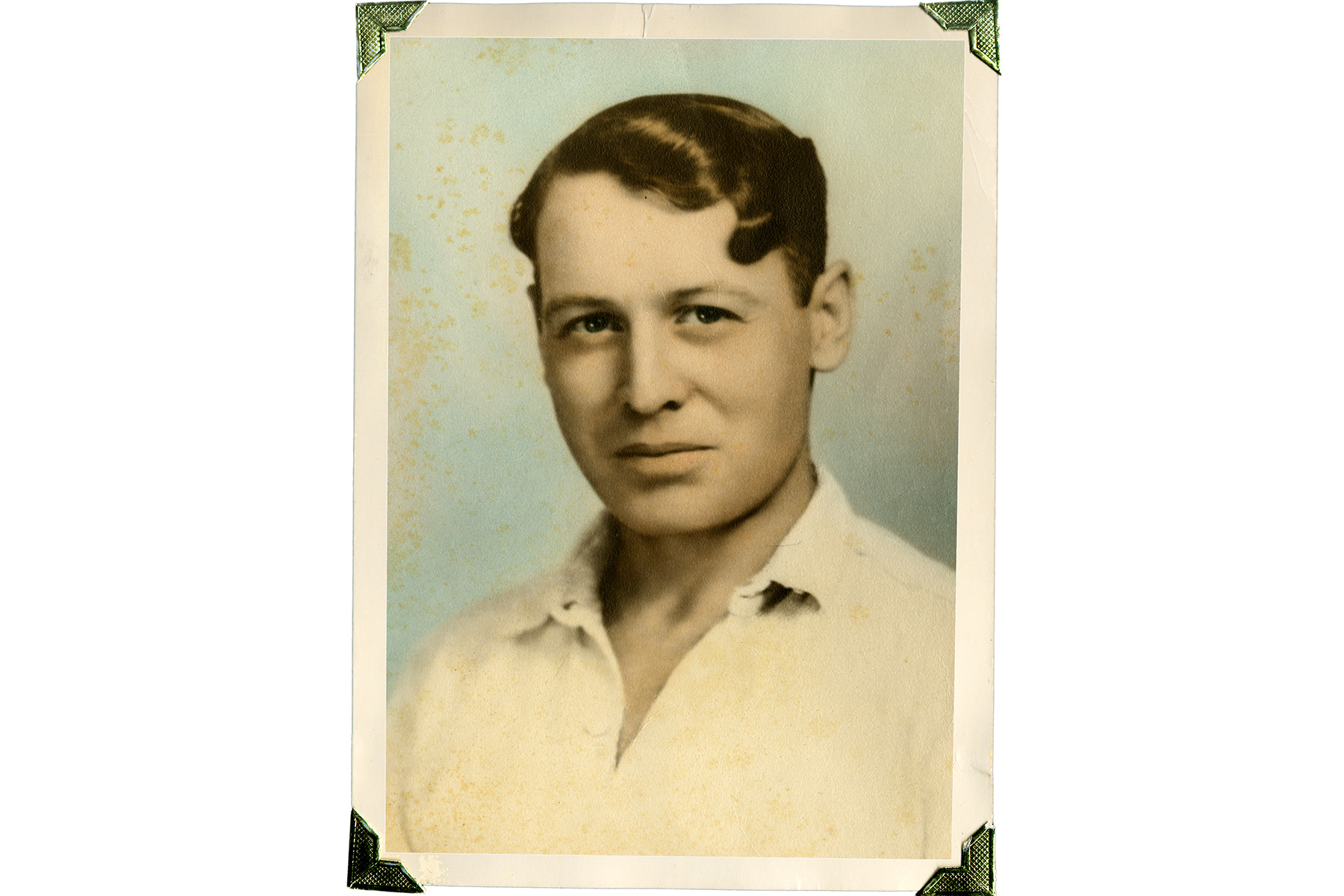If I hadn’t admitted myself to a mental hospital at age 27, I would never have met the man dubbed “The Meanest Man in Texas.” But, as it turned out, I wrote a book about him, adapted it into a screenplay, and spent decades trying to get it made into a movie while teaching at SMU. Thirty-nine years after the project began, I served as executive producer on the film.
It was alcohol that led to my mental instability. Initially, though, drinking seemed to have positive effects. In high school, I discovered that a few beers would take away my anxieties about dating girls and popularity. Genetics probably played a role in the way I processed alcohol. My maternal grandfather ruined his life with booze and ended up in a state mental hospital.
Daily drinking led to flunking out of college in Michigan, where I had grown up. I transferred to religiously oriented Lipscomb University in Nashville, Tennessee, where drinking was forbidden. I tested that rule and found out they were as serious as sin about it.
Upon graduation, I started drinking again and worked as a print journalist in the Detroit area. I thrived professionally and won awards as a columnist and investigative reporter, but I lived with neurotic thoughts of impending doom that kept getting worse.
Late one night, I placed a frantic call to a suicide prevention center. “Are you drinking?” asked the woman who answered. “Of course,” I told her. “You need to stop it,” she replied. I hung up.
Two mornings later, I woke up in absolute terror and chugged both beer and whiskey, with no relief. Where else could I turn? A friend drove me to a private mental hospital. That was November 6, 1973. Through God’s grace, my last drink containing alcohol was in the parking lot just before entering.
A fellow patient talked with me about alcoholism and recommended a place to go for help. Could alcohol be the cause of my problems rather than the solution? The answer was yes. I confirmed this upon leaving the hospital after two weeks and attending meetings of a problem-drinker group. Long-term sobriety, I learned, was dependent on my relationship with God and not picking up the first drink.
Between the meetings and church attendance for the first time in four years, my mental situation kept improving. Some two years later, I accepted a job in Lubbock, a great leap in distance and culture.
One Sunday in 1977, former convict Clyde Thompson was the guest speaker at my church. His problems started at age 17 while he was hunting with two friends near Cisco, Texas, in 1928. They decided to confront a pair of brothers whom Clyde had not met, but whom his buddies disliked. The naive Clyde was goaded into joining a fight that broke out. He was carrying a gun and played a role in killing the brothers. He received a life sentence.
In brutal prison farms during the 1930s, Clyde learned that he had to be tough to survive. He killed two fellow inmates in knife fights and was involved in escape attempts in which other inmates were killed. Texas prison officials finally gave him the “meanest man” moniker and put him in a special solitary confinement cell for six years. With no hope and nowhere else to turn, Clyde finally reached out to God.
During his transformation, Clyde developed a relationship via the U.S. mail with Julia Perryman, a woman on the outside who was a prisoner of a severe spinal deformity resulting from scoliosis. She would end up playing a major role in his life.
Hearing Clyde’s story, I recognized parallels between his life and mine. We each hit rock bottom under dire circumstances, reached out to God, and the trajectory of our lives changed for the better. I pictured his dramatic story as a movie that would demonstrate this: no matter how low in life a person gets, God will help if He is asked.
We met and agreed that I would be his feature-film biographer, even though I’d never seen a screenplay. As a model, I used a script from the Columbo television series loaned to me by one of my professors in the graduate program at Texas Tech.
After I completed the first draft of the screenplay, it somehow ended up in the hands of Erwin Hearne, a producer on three of the Benji movies. He called and was very encouraging. His praise, however, was tempered by his saying my chances of getting the movie produced were 50,000 to 1.
Clyde died suddenly of a heart attack in 1979. I knew then that if I failed to tell his story, it would be buried with him. Attempting to market the script, I called Billy Graham’s World Wide Pictures and got connected with Twila Knaack, an accomplished author. She encouraged me to first write the story as a book. This, she said, would improve the prospects of making a movie.
After serving as a teaching assistant at Texas Tech, I accepted a full-time faculty position there. I used my summers to work on the book, a daunting task considering all the research needed to supplement my interviews with Clyde.
Nearly five years passed before the book was published. Though it was well received, it did not immediately open doors in Hollywood. I moved to the University of Texas and earned a Ph.D., and then I accepted a faculty position at SMU, teaching there for 22 years before retiring from academia in 2008 to work full time as a writer.
During these three decades, I made every conceivable effort to get the movie made but was still not successful. From time to time, I would re-read the script to see how it might be improved.
A major revision came after I watched Cool Hand Luke for the first time in many years. Most of it was set at one prison farm, minimizing locations and allowing for continuity of supporting characters. I followed suit for both reasons. In doing this, I also wrote a great warden role who would serve as Clyde’s adversary during most of acts two and three.
Sometime later, I hired a Hollywood script doctor to advise me. Although readers of the book don’t meet Julia until they are two-thirds of the way through, he recommended introducing her much earlier in the script. He also advised me to remove the spiritual angle and make the film about “a victory of the human spirit,” citing The Blind Side as an example. But I wasn’t willing to abandon my very reason for wanting to make this movie.
In 2013, there was a picture of Casey Bond on the front of Lipscomb University’s alumni magazine. A college baseball star, he’d been drafted by the San Francisco Giants and played two years in that organization. The story told how Casey had a breakthrough role as pitcher Chad Bradford in Moneyball, alongside Brad Pitt, Philip Seymour Hoffman, and Jonah Hill. The article also described Casey as being a partner in the production company Higher Purpose Entertainment.
I messaged Casey about my project with no expectations that I would receive an answer. Much to my surprise, he wrote back saying he liked the “Meanest Man” title and concept.
About two months later, I met Casey’s partner, Los Angeles-based Brad Wilson. We clicked almost instantly. Brad grew up in Oak Cliff and had worked for 11 years as head of production for Robert Duvall’s company. Brad and Casey optioned my script, and we spent more than a year raising the funds to produce it. Justin Ward came on as director and worked with me in improving the screenplay. The movie was shot in 2016.
My wife, Kim, and I flew to Los Angeles to spend a week with the film crew. The morning after we arrived, Brad met us outside the sound stage and took us in to watch a scene being shot. Everyone in the cast and crew had been told that I had spent 39 years working on the project. When Justin announced, “Don Umphrey has just joined us,” they applauded.
It was a surreal moment when a crew member announced, “We’re rolling!” and my long-time dream started coming to life right in front of me.
Do grown men cry? This one sure did.
The Meanest Man in Texas will be released in two North Texas theaters on May 17.
It was alcohol that led to my mental instability. Initially, though, drinking seemed to have positive effects. In high school, I discovered that a few beers would take away my anxieties about dating girls and popularity. Genetics probably played a role in the way I processed alcohol. My maternal grandfather ruined his life with booze and ended up in a state mental hospital.
Daily drinking led to flunking out of college in Michigan, where I had grown up. I transferred to religiously oriented Lipscomb University in Nashville, Tennessee, where drinking was forbidden. I tested that rule and found out they were as serious as sin about it.
Upon graduation, I started drinking again and worked as a print journalist in the Detroit area. I thrived professionally and won awards as a columnist and investigative reporter, but I lived with neurotic thoughts of impending doom that kept getting worse.
Late one night, I placed a frantic call to a suicide prevention center. “Are you drinking?” asked the woman who answered. “Of course,” I told her. “You need to stop it,” she replied. I hung up.
Two mornings later, I woke up in absolute terror and chugged both beer and whiskey, with no relief. Where else could I turn? A friend drove me to a private mental hospital. That was November 6, 1973. Through God’s grace, my last drink containing alcohol was in the parking lot just before entering.
A fellow patient talked with me about alcoholism and recommended a place to go for help. Could alcohol be the cause of my problems rather than the solution? The answer was yes. I confirmed this upon leaving the hospital after two weeks and attending meetings of a problem-drinker group. Long-term sobriety, I learned, was dependent on my relationship with God and not picking up the first drink.
Between the meetings and church attendance for the first time in four years, my mental situation kept improving. Some two years later, I accepted a job in Lubbock, a great leap in distance and culture.
One Sunday in 1977, former convict Clyde Thompson was the guest speaker at my church. His problems started at age 17 while he was hunting with two friends near Cisco, Texas, in 1928. They decided to confront a pair of brothers whom Clyde had not met, but whom his buddies disliked. The naive Clyde was goaded into joining a fight that broke out. He was carrying a gun and played a role in killing the brothers. He received a life sentence.
I pictured his dramatic story as a movie that would demonstrate this: no matter how low in life a person gets, God will help if He is asked.
In brutal prison farms during the 1930s, Clyde learned that he had to be tough to survive. He killed two fellow inmates in knife fights and was involved in escape attempts in which other inmates were killed. Texas prison officials finally gave him the “meanest man” moniker and put him in a special solitary confinement cell for six years. With no hope and nowhere else to turn, Clyde finally reached out to God.
During his transformation, Clyde developed a relationship via the U.S. mail with Julia Perryman, a woman on the outside who was a prisoner of a severe spinal deformity resulting from scoliosis. She would end up playing a major role in his life.
Hearing Clyde’s story, I recognized parallels between his life and mine. We each hit rock bottom under dire circumstances, reached out to God, and the trajectory of our lives changed for the better. I pictured his dramatic story as a movie that would demonstrate this: no matter how low in life a person gets, God will help if He is asked.
We met and agreed that I would be his feature-film biographer, even though I’d never seen a screenplay. As a model, I used a script from the Columbo television series loaned to me by one of my professors in the graduate program at Texas Tech.
After I completed the first draft of the screenplay, it somehow ended up in the hands of Erwin Hearne, a producer on three of the Benji movies. He called and was very encouraging. His praise, however, was tempered by his saying my chances of getting the movie produced were 50,000 to 1.
Clyde died suddenly of a heart attack in 1979. I knew then that if I failed to tell his story, it would be buried with him. Attempting to market the script, I called Billy Graham’s World Wide Pictures and got connected with Twila Knaack, an accomplished author. She encouraged me to first write the story as a book. This, she said, would improve the prospects of making a movie.
After serving as a teaching assistant at Texas Tech, I accepted a full-time faculty position there. I used my summers to work on the book, a daunting task considering all the research needed to supplement my interviews with Clyde.
Nearly five years passed before the book was published. Though it was well received, it did not immediately open doors in Hollywood. I moved to the University of Texas and earned a Ph.D., and then I accepted a faculty position at SMU, teaching there for 22 years before retiring from academia in 2008 to work full time as a writer.
During these three decades, I made every conceivable effort to get the movie made but was still not successful. From time to time, I would re-read the script to see how it might be improved.
A major revision came after I watched Cool Hand Luke for the first time in many years. Most of it was set at one prison farm, minimizing locations and allowing for continuity of supporting characters. I followed suit for both reasons. In doing this, I also wrote a great warden role who would serve as Clyde’s adversary during most of acts two and three.
Sometime later, I hired a Hollywood script doctor to advise me. Although readers of the book don’t meet Julia until they are two-thirds of the way through, he recommended introducing her much earlier in the script. He also advised me to remove the spiritual angle and make the film about “a victory of the human spirit,” citing The Blind Side as an example. But I wasn’t willing to abandon my very reason for wanting to make this movie.
In 2013, there was a picture of Casey Bond on the front of Lipscomb University’s alumni magazine. A college baseball star, he’d been drafted by the San Francisco Giants and played two years in that organization. The story told how Casey had a breakthrough role as pitcher Chad Bradford in Moneyball, alongside Brad Pitt, Philip Seymour Hoffman, and Jonah Hill. The article also described Casey as being a partner in the production company Higher Purpose Entertainment.
I messaged Casey about my project with no expectations that I would receive an answer. Much to my surprise, he wrote back saying he liked the “Meanest Man” title and concept.
About two months later, I met Casey’s partner, Los Angeles-based Brad Wilson. We clicked almost instantly. Brad grew up in Oak Cliff and had worked for 11 years as head of production for Robert Duvall’s company. Brad and Casey optioned my script, and we spent more than a year raising the funds to produce it. Justin Ward came on as director and worked with me in improving the screenplay. The movie was shot in 2016.
My wife, Kim, and I flew to Los Angeles to spend a week with the film crew. The morning after we arrived, Brad met us outside the sound stage and took us in to watch a scene being shot. Everyone in the cast and crew had been told that I had spent 39 years working on the project. When Justin announced, “Don Umphrey has just joined us,” they applauded.
It was a surreal moment when a crew member announced, “We’re rolling!” and my long-time dream started coming to life right in front of me.
Do grown men cry? This one sure did.
The Meanest Man in Texas will be released in two North Texas theaters on May 17.
Get the FrontRow Newsletter
Get a front row seat to the best shows, arts, and things to do across North Texas. Never miss a beat.






